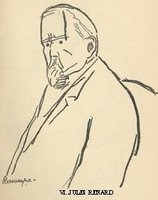Thursday, November 30, 2006
Stirring Performance
I tried to make out the lyrics or melody of his song to discern whether he was a manic musician or just manic, but the café chatter and the milk frothing machine drowned out the details. Then he struck up a conversation with a woman pouring cream into her coffee. His voice was deep and there was nothing unusual at all about the even volley of their brief chat. They walked out together, exchanging first names, but I could see how the internal music fueled the delicate and lively movement of his gait, his empty hand held out in front of him like a ballerina’s.
Tuesday, November 28, 2006
You're a Bittersweet Classic, Charlie Brown
 I heard this great piece on NPR this morning about how A Charlie Brown Christmas almost never made it on the air for the first time in 1965. CBS thought that the jazz didn't mix well with traditional carols, that the voices should be provided by professional child actors, and that the tone and themes were too heavy for kids. It turned out that half of the people watching television across the country that night tuned in to watch.
I heard this great piece on NPR this morning about how A Charlie Brown Christmas almost never made it on the air for the first time in 1965. CBS thought that the jazz didn't mix well with traditional carols, that the voices should be provided by professional child actors, and that the tone and themes were too heavy for kids. It turned out that half of the people watching television across the country that night tuned in to watch.The composer of the soundtrack, Vince Guaraldi, died unexpectedly of a heart attack in 1976. "He was found in a room at the Red Cottage Inn hotel, relaxing between sets at Butterfield's nightclub in Menlo Park, California. Guaraldi had just finished recording the soundtrack for It's Arbor Day, Charlie Brown earlier that afternoon."
He wasn't around to discover that his music had become modern Christmas classics. A remastered edition of the soundtrack, which has never been out of print, has been released this year.
Monday, November 27, 2006
What's Worth Saving
- Dara Horn, from an essay about writing her novel, The World to Come. Listen to her discuss the novel with Michael Silverblatt on KCRW's Bookworm (April 20, 2006).
Not What, but Who
 James Baldwin, speaking with Terry Gross on Writers Speak:
James Baldwin, speaking with Terry Gross on Writers Speak:The homosexual question is tied up with the whole American idea of masculinity: the whole infantile idea (according to me) and absolutely untrue. To be a man is much more various than the American myth has it. As I myself have lived and I have observed, love is where you find it. Your maturity, I think, is signaled by the depth or extent to which you can accept the dangers and the power and the beauty of love.
The Artist's Job
 "[The artist's] job is not to present merely the external life of his character. He must fit his own human qualities to the life of this other person, and pour into it all of his own soul. The fundamental aim of our art is the creation of this inner life of a human spirit, and its expression in an artistic form."
"[The artist's] job is not to present merely the external life of his character. He must fit his own human qualities to the life of this other person, and pour into it all of his own soul. The fundamental aim of our art is the creation of this inner life of a human spirit, and its expression in an artistic form." Friday, November 24, 2006
Multitudes
Thursday, November 23, 2006
There's Diversity Within Me

Excerpt from Don Gregorio Comanini’s poem on the Giuseppe Arcimboldo painting of Emperor Rudolf II as Vertumnus, the Roman god of vegitationa and transformation. The portrait was a gift to the emperor after Acrimboldo left Prague to return to his native Milan in 1587.
Tuesday, November 21, 2006
Imagining Happiness
 From Happiness: A Guide to Developing Life's Most Important Skill
From Happiness: A Guide to Developing Life's Most Important Skillby Matthieu Ricard
To imagine happiness as the achievement of all our wishes and passions is to confuse the legitimate aspiration to inner fulfillment with a utopia that inevitably leads to frustration.
In affirming that "happiness is the satisfaction of all our desires" in all their "multiplicity," "degree," and "duration," Kant dismisses it from the outset to the realm of the unachievable. When he insists that happiness is the condition of one for whom "everything goes according to his wish and will" we have to wonder about the mystery whereby anything might go according to our wishes and will.
Even if, ideally, the satisfaction of all our desires were achievable, it would lead not to happiness but in the creation of new desires or, just as likely, to indifference, disgust, or even depression. Why depression? If we were to convince ourselves that satisfying all our whims would make us happy, the collapse of that delusion would make us doubt the very existence of happiness.
If I have more than I could possibly need and I am still not happy, happiness must be impossible. That's a good example of how far we can go in fooling ourselves about the causes of happiness. The fact is that without inner peace and wisdom, we have nothing we need to be happy.
The Influence of Strangers
 “Tennessee [Williams] didn’t fit comfortably into his own minority, so I had the confidence not to fit either.”
“Tennessee [Williams] didn’t fit comfortably into his own minority, so I had the confidence not to fit either.”
Face Blindness

Monday, November 20, 2006
The Tearless and Unblinking Distance
 "The difference between a cult and faith is time. I believe that we are a single organism, and that something is at stake in this particular moment...We are going to be doing a story that is on HBO and there are these endearing characters. It is about surfing, but some of the characters levitate...Ostensibly it is about a family of surfers who seem to have become more and more disassociated from themselves and from good surfing. They were all champions, and they are in one way or another alienated, loaded and ascetic...And then a strange guy comes into their life: John from Cincinnati."
"The difference between a cult and faith is time. I believe that we are a single organism, and that something is at stake in this particular moment...We are going to be doing a story that is on HBO and there are these endearing characters. It is about surfing, but some of the characters levitate...Ostensibly it is about a family of surfers who seem to have become more and more disassociated from themselves and from good surfing. They were all champions, and they are in one way or another alienated, loaded and ascetic...And then a strange guy comes into their life: John from Cincinnati." "...the look of the show...was informed not by Martin Scorcese or MTV, but by his mentor Robert Penn Warren."
“Have you ever seen moonlight on the Wabash as the diesel rigs boom by? Have you ever wondered how the moonlit continent might look through the tearless and unblinking distance of God’s wide eye,” he quoted Warren over the phone. “I have been working to make sure that the camera is stationed at a tearless and unblinking distance.”
- David Milch discussing his new television series John from Cincinnati with David Carr from The New York Times (11/20/2006)
Iraq in Fragments
 "Iraq in Fragments illuminates post-war Iraq in three acts, building a vivid picture of a country pulled in different directions by religion and ethnicity. Filmed in verité style, with no scripted narration, the film power fully explores the lives of ordinary Iraqis: people whose thoughts, beliefs, aspirations, and concerns are at once personal and illustrative of larger issues in Iraq today." (Typecast Pictures)
"Iraq in Fragments illuminates post-war Iraq in three acts, building a vivid picture of a country pulled in different directions by religion and ethnicity. Filmed in verité style, with no scripted narration, the film power fully explores the lives of ordinary Iraqis: people whose thoughts, beliefs, aspirations, and concerns are at once personal and illustrative of larger issues in Iraq today." (Typecast Pictures)
- "From 300 hours of material, Mr. Longley has created a collage of images, sounds and characters, an intimate, partial portrait of an unraveling nation -- a portrait that gains power partly by virtue of its incompleteness." A.O. Scott, The New York Times
- "Alone among the works I've seen and read about Iraq in the last three years, Iraq in Fragments captures the tremendous complexity and variability of the country, offering neither facile hope nor fashionable despair." Andrew O'Hehir, Salon.com
3,000 Messages Per Day
- From Net Worth: Shaping Markets When Customers Make the Rules, by John Hagel III and Marc Singer (Harvard Business School Press)
The Bureaucracy of Mass Murder

The fifty million pages of files include “scraps of paper, transport lists, registration books, labor documents, medical and death registers make reference to 17.5 million individuals caught up in the machinery of persecution, displacement, and death."
To operate history's greatest slaughter, the Nazis created a bureaucracy that meticulously recorded the arrest, movement and death of each victim. What documents survived Nazi attempts to destroy them were collected by the Allies to help people find missing relatives. The first documents were sent in 1946 to Bad Arolsen, and the administration was handed over to the Red Cross in 1955."
Anne Frank is listed among the names of Jews picked up from Amsterdam and transported to concentration camps.
“But most of the lives recorded in Bad Arolsen are known to none but their families. They are people like Cornelis Marinus Brouwenstijn, a Dutchman who vanished into the Nazi gulag at age 22 for illegally possessing a radio. In a plain manila envelope are his photo, a wallet, some snapshots, and a naughty typewritten joke about women in the army.”
"Over the years, the International Tracing Service has answered 11 million requests to locate family members or provide certificates supporting pension claims or reparations. It says it has a 56 percent rate of success in tracing the requested name. But the workload has been overwhelming. Two years ago it had a backlog of nearly half a million unanswered queries. Director Blondel says the number was whittled down to 155,000 this summer and will disappear by the spring of 2008. New queries have slowed to just 700 a month."
“Compounding the delay in releasing the files is the cumbrous makeup of the governing committee. Any decision on their future requires the assent of all 11 member nations — Belgium, Britain, France, Germany, Greece, Israel, Italy, Luxembourg, the Netherlands, Poland and the United States.”
Archivist Sabine Stein: "Former inmates and their families want to see some tangible part of their history; they want to tell their stories. What I find most frustrating is that they have all these documents and they are just sitting on them."
Paul Shapiro, of the U.S. Holocaust Memorial Museum in Washington:"What victims of these crimes fear the most is that when they disappear — and it's happening very fast now — no one will remember the names of the families they lost.”
PS This post has been conjuring up images of Anselm Kiefer's lead books (Zweistromland, Buch mit Flügeln).
Sunday, November 19, 2006
Free Running vs. Parkour
The opening scene in the new James Bond movie, Casino Royale, reminded me of a video clip of a kid scaling buildings and doing diving flips off them then immediately getting back up to run off in search of more obstacles. It turns out there are a couple of terms describing this activity. They started out as synonymous, but have parted ways based on intent.
- Free running uses acrobatic moves to respond with buildings and their environment in an emphasis on asthetics and athletics.
- Parkour is more about being able to quickly escape and evade pursuers using free running techniques to access the inaccessible.
Bond is obviously interested in parkour, but jump over the first two minutes of this clip to get a taste of free running:
Saturday, November 18, 2006
Strange Conversation
 Kris Delmhorst was inspired by the work of well-known poets (Walt Whitman, Robert Browning, E.E. Cummings, Lord Byron, George Eliot and Edna St. Vincent Millay, etc.) to compose the songs on her latest album, Strange Conversation. "Some of the poems are set verbatim to music, some dismantled and reassembled in significantly new renditions, others merely used as the jumping-off point for Delmhorst's own literate lyrical take."
Kris Delmhorst was inspired by the work of well-known poets (Walt Whitman, Robert Browning, E.E. Cummings, Lord Byron, George Eliot and Edna St. Vincent Millay, etc.) to compose the songs on her latest album, Strange Conversation. "Some of the poems are set verbatim to music, some dismantled and reassembled in significantly new renditions, others merely used as the jumping-off point for Delmhorst's own literate lyrical take."Excerpt from From Light of the Light
lyrics adapted from: Walt Whitman, "A Passage to India"
O my soul.
Steer us to uncharted waters, hoist the anchor, shake out every sail.
My brave soul.
If they’re all the seas of heaven
Why should we not go where all maps fail?
Everything is Music
lyrics adapted from Rumi, "Where Everything Is Music"
We've come to the place where everything is music
Everything is music, let it play.
Why do you stay in jail when the door is wide open?
Let the beauty that you love be what you do.
Stop talking now, open up the window
The one right there in the middle of your heart
Give us your hands, sit down in this circle
You know you got no need to keep yourself apart
Today you wake up sad and empty, don't go back to sleep.
There's a million ways to kneel and kiss the ground.
Don't worry now, about saving all these songs,
There's so many more just waiting to be found.
And if all these instruments should disappear
We would still hear something coming up from way down in the ground
Because we've come to the place where everything is music
Everything is music, let it play.
NPR interview from November 16, 2006 (thanks rrobinson)
Friday, November 17, 2006
Authority
 I once found myself unable to smooth talk a delusional old man into returning to the psychiatric hospital after learning that he'd left against medical advice. He had spent the past several days lying on his couch in the same immodest turquoise gown they had given him and that he'd walked home in. There was a piece of tape on one forearm from the IV they'd used to rehydrate him.
I once found myself unable to smooth talk a delusional old man into returning to the psychiatric hospital after learning that he'd left against medical advice. He had spent the past several days lying on his couch in the same immodest turquoise gown they had given him and that he'd walked home in. There was a piece of tape on one forearm from the IV they'd used to rehydrate him.He was so entranced by voices and grand ideas that he only got up to snack on leftover KFC mashed potatoes and gravy from the fridge. He had lost interest in his usual pastimes: composing poetry (Martin Luther King Jr. is a hell of a man,/I’m not fit to kiss that man’s shoes) and sticking Hustler Magazine pages to his walls with paste he made himself out of flour and water.
He was not taking his medications or washing himself or his clothes. None of my usual strategies were working. When he finally chased me out of his subsidized apartment brandishing a plastic spoon yelling, “If you don’t get out of here, I’m going to stuff these potatoes up your ass,” the only choice was to call for an ambulance.
Our problem wasn’t a big priority since he could probably stay alive indefinitely with this set of symptoms. I sat waiting on the hallway stairs while I rescheduled appointments and caught up on paperwork. When two firemen arrived, I reviewed the situation with them. They seemed bored by the abundance of healthy vital signs. One of them said to him, “Sir, why don’t you let your case manager drive you over to the hospital?”
He paused, turning his face away to consider the idea, then said, “Okay.”
As we pulled away, he waved good-bye to the men like a little boy after visiting a pilot in an airplane cockpit. I could sense their pity for him that I didn’t try asking him nicely to begin with, not realizing that it was their uniforms that had sealed the deal.
Thursday, November 16, 2006
Common Sense, Dancing
- William James
To Waiting
 To Waiting
To WaitingYou spend so much of your time
expecting to become
someone else
always someone
different to whom a moment
whatever moment it may be
at last has come
and who has been
met and transformed
into no longer being you
and so has forgotten you
meanwhile in your life
you hardly notice
the world around you
lights changing
sirens dying along the buildings
your eyes intent
on a sight you do not see yet
not yet there
as long as you
are only yourself
with whom as you
recall you were
never happy
to be left alone for long
- by W.S. Mervwin from Present Company (KCRW Bookworm)
Where To Live
Richard Florida, professor at George Mason University in Virginia and author of "The Rise of the Creative Class," summarized conclusions from a recent summit of the mavens of the economic development and the psychology of happiness: "Place is as important as having a job that challenges you, but not as important as relationships with family and friends."
- Penelope Trunk
Wednesday, November 15, 2006
Balance
Tuesday, November 14, 2006
Jules Renard
 French novelist Jules Renard published his journal in 1925. In an introduction to his own journal, A Writer's Notebook, Somerset Maugham says of Renard's, "The journal is wonderfully good reading. It is extremely amusing. It is witty and subtle and often wise... Jules Renard jotted down neat retorts and clever phrases, epigrams, things seen, the sayings of people and the look of them, descriptions of scenery, effects of sunshine and shadow, everything, in short, that could be of use to him when he sat down to write for publication."
French novelist Jules Renard published his journal in 1925. In an introduction to his own journal, A Writer's Notebook, Somerset Maugham says of Renard's, "The journal is wonderfully good reading. It is extremely amusing. It is witty and subtle and often wise... Jules Renard jotted down neat retorts and clever phrases, epigrams, things seen, the sayings of people and the look of them, descriptions of scenery, effects of sunshine and shadow, everything, in short, that could be of use to him when he sat down to write for publication."- Writing is the only way to talk without being interrupted.
- Writing is an occupation in which you have to keep proving your talent to people who have none.
- Laziness is nothing more than the habit of resting before you get tired.
- Failure is not the only punishment for laziness; there is also the success of others.
- We spend our lives talking about this mystery. Our life.
- We don't understand life any better at forty than at twenty, but we know it and admit it.
- Fame is a constant effort.
- There are good and bad times, but our mood changes more often than our fortune.
- Look for the ridiculous in everything, and you will find it.
- Don't tell a woman she's pretty; tell her there's no other woman like her, and all roads will open to you.
- The only man who is really free is the one who can turn down an invitation to dinner without giving an excuse.
- If money does not make you happy; give it back.
Friday, November 10, 2006
Vachel Lindsey
 It's the birthday of the poet Vachel Lindsey, born in Springfield, Illinois (1879). His parents wanted him to become a doctor, but he dropped out of medical school after three years and tried to make a living drawing pictures and writing poetry. After struggling for several years and working for a time in the toy department of Marshall Fields, he decided to walk across the United States, trading his poems and pictures for food and shelter along the way.
It's the birthday of the poet Vachel Lindsey, born in Springfield, Illinois (1879). His parents wanted him to become a doctor, but he dropped out of medical school after three years and tried to make a living drawing pictures and writing poetry. After struggling for several years and working for a time in the toy department of Marshall Fields, he decided to walk across the United States, trading his poems and pictures for food and shelter along the way.Then in 1913, Poetry magazine published Lindsay's poem "General William Booth Enters into Heaven," and it was a big hit. He became one of the leaders of the movement to revive poetry as an oral rather than a written art form, and he spent much of the rest of his life traveling around the country, reciting his work for audiences.
The Writer's Almanac
De Gustibus Non Est Disputandum
It’s hard not to be mystified by the taste of others. No wonder the Romans coined the expression de gustibus non est disputandum - tastes are not to be disputed.
But I think you can make some generalizations about how taste works. I think we’re drawn to call something beautiful whenever we detect that it contains, in a concentrated form, those qualities in which we personally, or our society’s more generally, are deficient.
You’ll call a nearly blank canvas beautiful when your own life is slightly messy and your city chaotic. We call good taste, a style which can move us away from what we fear and towards what we crave. A style which carries a correct dosage of our missing virtues.
Viewed in this light, a given stylistic choice will tell us as much about what someone lacks inside as what he or she likes.
Unforeseen
by Reid Bush
Before we buried him, no one thought
to trace around his hand.
It would have been an easy thing to do
if you could stand his fingers cold, stiff:
just a piece of paper underneathand pen or pencil.
I don't think there's anybody
could half imagine in a million years
how much since he died we've argued
over just how big his hands were.
It's hard to know when you need to
what it is you're going to want.
[from Jonathan Carroll's blog]
Thursday, November 09, 2006
What You Get And Don't Get
- Phillip Moffitt
Wednesday, November 08, 2006
No Content
 "You can ask me anything you want about acting and I will try and answer. But if what you want to know about is fame and celebrity, then I can't help you. Because the whole celebrity thing has no content to it. It's not valuable, it's not meaningful, it's not anything. It's not real."
"You can ask me anything you want about acting and I will try and answer. But if what you want to know about is fame and celebrity, then I can't help you. Because the whole celebrity thing has no content to it. It's not valuable, it's not meaningful, it's not anything. It's not real."That's What We're Trying To Do Over Here
 Were you wondering how Sacha Baron Cohen get all of those people to embarrass themselves in his movie? Like rodeo director, Bobby Rowe, who recommends that Borat shave his mustache so that he wouldn't look quite so Muslim and make people nervous about whether he's got explosives strapped to his body. Rowe also responds to Borat's claim that back in his country they put gays in prison and hang them saying, "That's what we're trying to do over here."
Were you wondering how Sacha Baron Cohen get all of those people to embarrass themselves in his movie? Like rodeo director, Bobby Rowe, who recommends that Borat shave his mustache so that he wouldn't look quite so Muslim and make people nervous about whether he's got explosives strapped to his body. Rowe also responds to Borat's claim that back in his country they put gays in prison and hang them saying, "That's what we're trying to do over here."After Borat praises Bush's "war of terror" and works the crowd up with images of the president of the United States drinking "the blood of every single man, woman, and child in Iraq," he butchers the national anthem so badly that they finally turn on him.
Rowe told Newsweek, "I go out there, and I say, 'Get the hell outta this dadgum building! Half the sumbucks in here are probably packin' heat, and they'll put you in front of the firin' squad.' Boy, they got in their trucks and hauled boogie."
With a budget of $18 million, Borat made $26.5 million in its opening weekend earning the highest wide release opening gross for a film showing on under 1,100 screens.
Metacritic reviews of Borat
Tuesday, November 07, 2006
The Mind's True Nature
 "Blind to the mind's true nature, we hold fast to our thoughts, which are nothing but manifestations of that nature. This freezes awareness into solid concepts, such as I and other, desirable and detestable, and plenty of others...Once you have recognized the true nature of reality, which is empty and at the same time appears as the phenomenal world, your mind will cease to be under the power of delusion. If you know how to leave your thoughts free to dissolve by themselves as they arise, they will cross your mind as a bird crosses the sky -- without leaving any trace."
"Blind to the mind's true nature, we hold fast to our thoughts, which are nothing but manifestations of that nature. This freezes awareness into solid concepts, such as I and other, desirable and detestable, and plenty of others...Once you have recognized the true nature of reality, which is empty and at the same time appears as the phenomenal world, your mind will cease to be under the power of delusion. If you know how to leave your thoughts free to dissolve by themselves as they arise, they will cross your mind as a bird crosses the sky -- without leaving any trace."Dilgo Khyentse Rinpoche (1910-1991)
Sunday, November 05, 2006
Questions for James Ellroy
 What I like about the era I am writing about, meaning 1958 to 1972, is that the anti-Communism mandate justified virtually any kind of clandestine activity. I like exploring the mind-set of extreme expediency.
What I like about the era I am writing about, meaning 1958 to 1972, is that the anti-Communism mandate justified virtually any kind of clandestine activity. I like exploring the mind-set of extreme expediency.What about more contemporary forms of expediency, like the anti-terrorism measures practiced by the Bush administration?
I do not follow contemporary politics. I live in a vacuum. I don’t read books. I don’t read newspapers. I do not own a TV set or a cellphone or a computer. I spend my evenings alone, usually lying in the dark talking to women who aren’t in the room with me.
You mean they’re on the phone?
No. They’re metaphysical. I brood. I brood about former women in my life. Potential future women in my life. I ignore the culture. I don’t want it to impede, impair, interdict, suppress or subsume my imagination with extraneous influences.
Is this an act? Are you trying to pass yourself off as the sort of isolated sociopath who is a stock character in crime fiction?
No. I am not acting. There are times when I think it isn’t quite kosher to be lying in the dark talking to women who aren’t in the room with me. And it turns into a certain kind of hauntedness and loneliness. But by and large, I dig it.
You’re oddly cheerful for a self-described hermit.
I am happy by and large. I work hard. And I love life. I am having a blast.
- Deborah Solomon, New York Times Magazine, November 5, 2006
It Could Go Away Again Forever
Dilbert cartoonist Scott Adams has made a miraculous recovery from a strange disease called Spasmodic Dysphonia that made it impossible for him to talk normally for more than a year. SD, which affects some 30,000 Americans, affects the portion of the brain that controls speech. Sufferers typically cannot speak at all unless reciting poetry, laughing, or using an exaggerated falsetto or baritone. Most patients never recover, but Adams' voice returned to him suddenly while he was chanting "Jack Be Nimble" as an exercise. "I don't even know if my voice is going to last," he said. "Maybe this is an illusion. It came back, but in a few days it could go away again forever."
From a December 2005 entry posted on the Dilbert blog
It’s bad enough to find out that I’ll probably never speak normally to another person for the rest of my life. But to make things worse, my notorious cleverness makes people think I’m joking when I explain it. The following scene has been played out about 100 times in the past week.
Me (hoarse whisper): “Hi. How…are…you?”
Other Person: “Ooh, sounds like you have laryngitis”
Me (hoarse whisper): “No…it’s a… speaking disorder. It’s.. permanent.”
Other Person: “Ha Ha Ha Ha! You’re funny.”
Saturday, November 04, 2006
Droplets
by C.K. Williams, from Love About Love
Even when the rain falls relatively hard,
only one leaf at a time of the little tree
you planted on the balcony last year,
then another leaf at its time, and one more,
is set trembling by the constant droplets,
but the rain, the clouds flocked over the city,
you at the piano inside, your hesitant music
mingling with the din of the downpour,
the gush of rivulets loosed from the eaves,
the iron railings and flowing gutters,
all of it fuses in me with such intensity
that I can't help wondering why my longing
to live forever has so abated that it hardly
comes to me anymore, and never as it did,
as regret for what I might not live to live,
but rather as a layering of instants like this,
transient as the mist drawn from the rooftops,
yet emphatic as any note of the nocturne
you practice, and, the storm faltering, fading
into its own radiant passing, you practice again.
Thursday, November 02, 2006
Beautiful Awkward Pictures
 Check out Toni Collette's new CD, Beautiful Awkward Pictures. You can hear the songs at her web page and watch a video of the title song at YouTube. I read that is was only being released in Australia, but I downloaded it from iTunes.
Check out Toni Collette's new CD, Beautiful Awkward Pictures. You can hear the songs at her web page and watch a video of the title song at YouTube. I read that is was only being released in Australia, but I downloaded it from iTunes.I found some information about her singing background. She has been singing since she was 14: school musicals, the lead in a big musical production celebrating the bicentennial, advertising jingles, musicals in Sydney and on Broadway. She's been writing songs for about ten years.
Her husband, Dave Galafassi, is the drummer in her band.
9

I've been streaming the new Damien Rice CD, 9, and checking out the video clips while I wait to download it when it's available on iTunes.
I'm especially enjoying 9 crimes, rootless tree, dogs, grey room, and accidental babies. That's one of the things I admire about him. He seems to approach a project as a whole instead of putting out a couple of strong songs with a bunch that have been phoned in. It is sweet with intense sections. The trip from spare and simple to complex and powerful within one song seems to be his trademark.
If the woman he is singing to in accidental babies is a real person, I feel for her. I feel even worse for the guy Damien argues that she has settled for. He's not one to quickly extinguish a flame just because the relationship is over.
I love this from dogs:
She lives with an orange tree and a girl that does yoga. She picks her dead ones from the ground when we come over. And she gives - I get without giving anything - to me like a morning sun.


